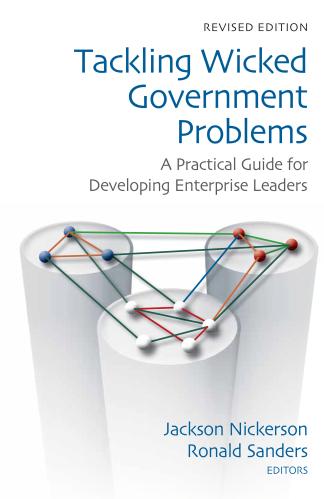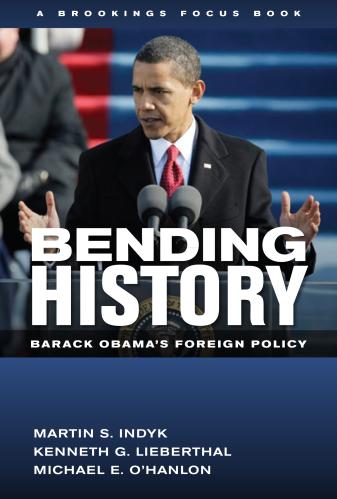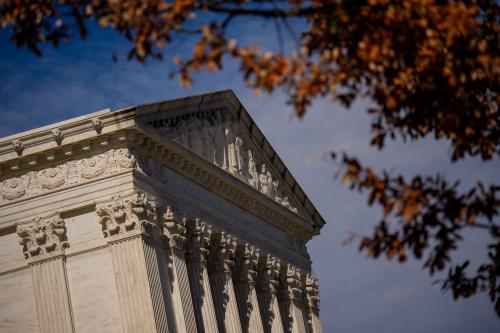As President Donald Trump works to fill the United States government with his appointees, it will take many months for these new initiates to find their sea legs. Although many mid-level officials lack raw power (that is, outsized resources and personnel), if they act responsibly, judiciously, and with savvy, they can enjoy a lot of influence and leave their mark. For those in this middle tier—be they appointees or newly elevated career officials—Hady Amr and Scott Lasensky offer the following tips for increased impact and greater influence. This piece originally appeared in Foreign Policy.
As President Donald Trump works to fill the United States government with his appointees, it will take many months for these new initiates to find their sea legs. Given how few Republican alumni are returning—another sign of rough seas ahead—it may take even longer, as anyone without federal experience faces a steep and daunting learning curve.
Among the hundreds of new officials who will take on foreign policy and national security assignments, many will be appointees who serve at the senior advisor or deputy assistant secretary/administrator level, as we did for a combined twelve years under President Barack Obama.
Although many mid-level officials lack raw power (that is, outsized resources and personnel), if they act responsibly, judiciously, and with savvy, they can enjoy a lot of influence and leave their mark.
For those in this middle tier—be they appointees or newly elevated career officials—we offer these tips for increased impact and greater influence.
Avoid groupthink. Sycophancy is far more common on the inside than dissent, which is one reason why targeted, purposeful dissent is such a valuable commodity. Every administration needs its loyal dissenters, and perhaps this administration more than most. Leaks to the media and “process fouls”—insider speak for when someone who circumvents established procedure—are far less damaging than groupthink.
Principals need dissent. It can help them avoid peril, or even run-of-the-mill blunders (think Ambassador to the United Nations Nikki Haley spiking Salam Fayyad as U.N. envoy to Libya).
Dissent is also necessary in order to sharpen debates and fine-tune policy before it is implemented, which is why every so often the savvy bureaucrat will choose to play devil’s advocate.
Try to air your disagreements with the boss behind closed doors, or at least within your bureaucratic home (your agency, bureau, or directorate). Use your daily or weekly “signals check,” if such a meeting or secure call exists. Weekly strategy sessions, especially if your office or agency has a less frenzied Friday pow-wow, are often the most effective moments to inject dissent.
Expressing dissent in writing, via secure channels, can be particularly powerful. When doing so, it is best to keep the conversation small, but not so small that you are communicating point-to-point with your principal, which can alienate other stakeholders.
The State Department’s dissent channel, as Paul Wolfowitz has written recently, is a carefully developed and valuable way for mainly careerists to express dissent internally, without fear of retribution. This is precisely why it was a mistake for the White House Press Secretary Sean Spicer to take aim at it.
At interagency meetings, when expressing dissent, try to ensure that your principal gives you a steer that also includes alternative policy options, which will make you being the skunk at the garden party all the more effective.
Break the stranglehold of your inbox. Life in the bureaucracy is busy. You will easily get sucked into the fast pace of interagency meetings, tracking “paper,” responding to Congress and outside constituents, and attending to your principal. Never allow yourself to forget that you are working toward broader goals like ending a civil war, stabilizing a war-torn region, stopping a pandemic, or restarting a failed negotiation. Force yourself to keep your eyes on the goalpost and take it upon yourself to remind your principal of the same.
Under normal circumstances, review meta-goals with your principal monthly or quarterly. You should do this daily or weekly during crises such as armed conflicts, war scares, intensified negotiations, or disease outbreaks.
Never allow the goal to be simply ensuring that the wheels of government turn, or that they turn faster. Resist being a hostage of your email inbox. Break free, and only then can you become an agent of sound and responsible policymaking.
Get out of your bureaucratic bubble. Build alliances with others in your agency and other agencies. Pay courtesy calls in-between interagency meetings. Do lunch at someone else’s office, or a neutral location. These lateral alliances can become some of the most powerful forces in policymaking. Logrolling is not just for Congress, it happens all the time in the executive agencies, despite the institutional forces that tend to keep you inside your own bureaucratic bubble.
Take up the pen. When you feel an issue is stuck, and the normal tempo of meetings and paper flow are not helping, write something yourself. Circulate a paper. Give it to your boss or offer it to a more powerful colleague and let them take the credit. If you are bold, then “table drop” at an inter-agency meeting (which, sad to say, adds an element of excitement, as geeky as that may seem). There’s tremendous value in turning off your email, closing the blinds, and cranking out a short policy paper. You can reframe a debate, inject a new idea to resolve a problem, or open others’ eyes to the reality of a failed or failing policy.
Taking up the pen generates attention. And nothing is more powerful in government than the appearance of a new idea. During a prolonged armed conflict, one of us wrote a paper that strengthened the consensus inside our own agency about a particular method of reaching a solution. Ultimately, it also helped reframe the interagency debate and speed up the policy process, something critically important in situations of armed conflict.
Meetings, meetings, meetings. Like it or not, the wheels of government typically turn around meetings, whether inside your agency or ideally in the interagency. We were both deeply involved in the interagency and approached some of the most sensitive and contentious issues, like how to respond to the various uprisings across the Middle East and the Civil War in Syria.
Making the most of meetings, for you and your principal, is an art form. Arrive early, especially for National Security Council meetings, where the pre-meeting banter can change policy.
Bone up, even if you think you are an expert. Review the latest intelligence, gather reports from the field, and review summaries of past meetings. Bureaucrats are busy and many will come to the table breathless and unprepared. Intense preparation, as former Secretary of State James Baker has fondly advised, will give you an edge.
You may never be the smartest person in the room, but you can be the most prepared. Review the agenda as early as possible, script out the meeting, and imagine the specific moments where your interventions will have the most impact. It may never evolve as you forecast, but the planning effort will always pay off.
Bring extra copies of key documents. Others will take notice and inevitably there will be disorganized attendees who fall in love with you simply for sharing your briefing materials. Engage the convener in advance, probe them on the agenda and their objectives for the meeting, and share the agenda (or a “bootleg” version) with your boss so you get a clear steer.
Your engagement should extend into the post-meeting period. This is especially true for interagency meetings, which tend to be documented more rigorously and for which the post-meeting process of codifying conclusions and tracking taskings itself is open to influence attempts.
Take your seat—don’t be a potted plant. For those lower on the pecking order, you may be blocked out of meetings, which is okay some of the time, but don’t let it become a habit. If you’ve done your homework and have something to say, always ask for a seat at the table, as one of our mentors advised, even if you get cut out half of the time.
Once inside the room, have no fear. Speak up, even if you are a “plus one” seated against the wall. Don’t outshine or surprise the boss, but being a wallflower is for the meek.
You need to seize any and every opportunity to express your views—assuming they are well thought out—and push for the policies you think will be successful. After all, why else did you sign up other than to shape policy?
Don’t scream. The Hollywood version of policymaking—screaming across the table or fist-pounding in the White House Situation Room—is rare. But some raised tones, fulminating, and having the phone slammed down is part of life in the U.S. government, especially for anyone dealing with life or death issues and fishbowl-type subjects where one wrong move can end a career.
But we never saw the screamers and the fit-throwers enjoy extra influence; often it was the opposite. At the end of the day, no one enjoys getting screamed at, and no one forgets it either.
You can argue forcefully and be assertive without being a jerk. If someone is conniving and undermining you, whether for personal or bureaucratic reasons, confront the person and do it respectfully and privately.
Have a thick skin. The vast majority of outbursts are not personal. “Everyone loses their cool” now and again, a senior official once said to one of us, apologetically, after a near-shouting match over an interagency disagreement.
Everyone is staff. Never lose sight of the reality that everyone, including the secretary of state and the national security advisor, has a boss. The people only elected two actors in the system: the president and the vice president. Their steer matters most. It may sound obvious, but it is critically important to reflect on this principle, particularly when you witness a principal or a deputy acting independently or imperiously.
Last but not least: Be generous. Make a point of nurturing and advising colleagues, especially junior colleagues. Step outside of yourself. Be a mentor, even when it is not requested of you. Reflect on the essential qualities of effective leadership and good governance and try to adapt and improve your own performance along the way.
It is the right thing to do and it is the smart thing to do, since inevitably today’s junior colleague could be tomorrow’s senior official.
Being generous, even amid the stress, long hours, and innumerable humiliations, is also good karma. At this unique moment, as our nation feels ripped apart, a bit of good karma will also go a long way.
The Brookings Institution is committed to quality, independence, and impact.
We are supported by a diverse array of funders. In line with our values and policies, each Brookings publication represents the sole views of its author(s).










Commentary
Op-edWho runs the world? Mid-level bureaucrats.
April 17, 2017